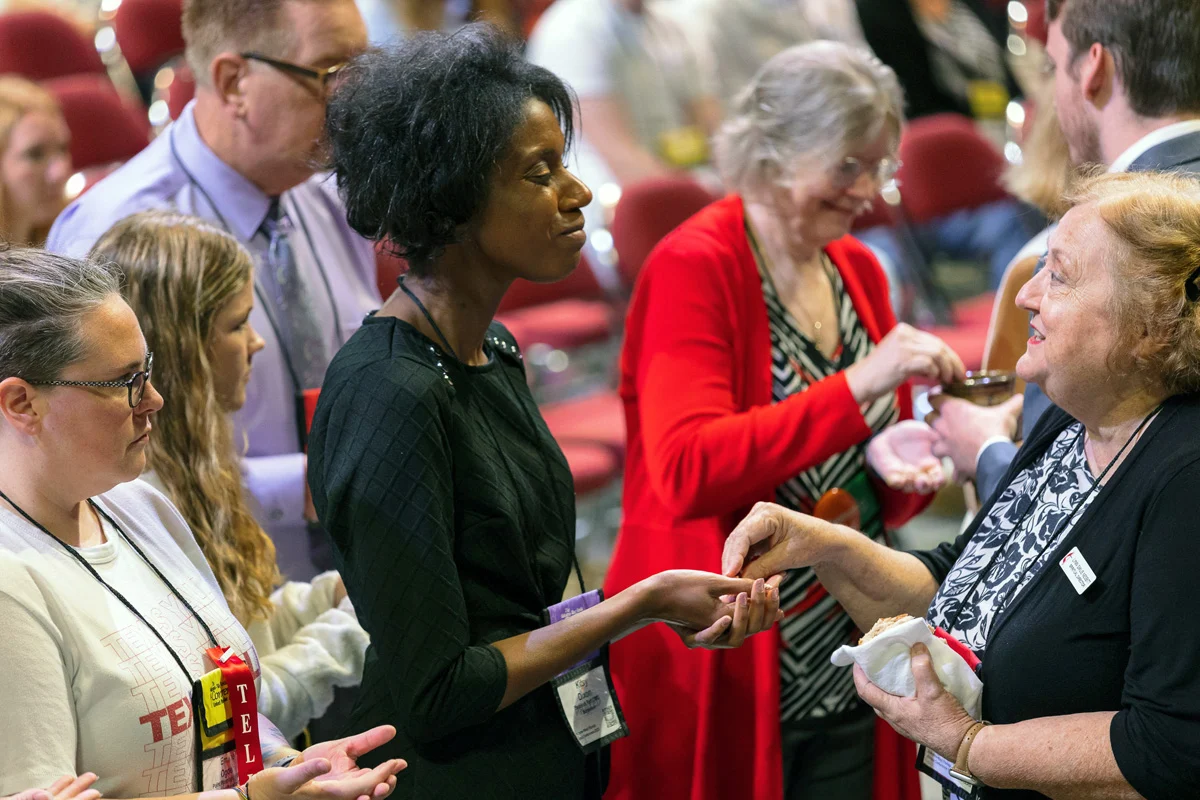The last couple of weeks have been busy with activity at our church related to our discernment process and now with a vote to hold a church vote on the future of our church.
I’ve seen some emails and texts being sent around with questions about the process and “what will happen if” types of scenarios being discussed.
So I wanted to take a moment to provide some information and my perspective on what has happened over the last few weeks.
The RUMC Discernment Team has recommended that Riverchase disaffiliate from the United Methodist Church and become part of the Foundry Network.
While I don’t support the recommendation from the team, I do appreciate the time that any church member puts into volunteering for the church. Be sure to thank them and anyone else that has to deal with the burden of guiding our congregation. As Charles Whitfield said to his friend, John Wesley in 1750: “After all, those who will live in peace must agree to disagree in many things with their fellow-labourers, and not let little things part or disunite them.”
The vote on the 11-member team was 7 to 4 in favor of disaffiliating. This equates to 63.6% of the team in favor of a church vote (and maybe disaffiliation from the United Methodist Church).
The vote tally likely reflects where we are as a church. Kinda split. I would also venture to guess that some of the seven aren’t necessarily supportive of disaffiliation, but are supportive of the entire church voting on its future. And if you had to pick a final destination just to get to a vote, then the Foundry Network likely made the most sense.
The recommendation to go move to the Foundry Network is based on three “concerns” listed in the Discernment Team’s final report.
Note: one of the “concerns” is based upon what other conferences and bishops in other areas of the country are doing, and does not seem to reflect our current Bishop’s repeated statements that she would always adhere to the Book of Discipline.
The Discernment Team’s report includes a “concern” about not being able to disaffiliate “under the same favorable conditions” at a later date.
This concern was confusing to me, so I re-read it a couple of times.
Essentially the report recommendation goes like this:
We as a Discernment Team wanted to see if the North Alabama Conference Trustees (who oversee property-related things at the conference level) would let us wait until after the 2024 General Conference to disaffiliate so we could see if there would be any Book of Discipline changes first.
The Conference Trustees said, ‘yeah, we’ll still work with you even after the December 31st deadline of this year so you can see if the Book of Discipline changes.’
So then we asked ‘hey, what if the Book of Discipline language about homosexuality doesn’t get removed and nothing changes – can we still disaffiliate?’. And then the Conference told us ‘no, you can’t disaffiliate later and have the property too’.
So we need to disaffiliate now.
The United Methodist Church has churches leave from time to time. Sometimes churches merge or close their doors completely. And because of this, Paragraph 2549 of the Book of Discipline lays out a way for churches to leave the United Methodist Church at any time.
That’s right – we could have left the UMC at any time in our history. So why is it important now?
A few words make all the difference in this “concern” bullet point:
“…we were concerned that if we chose to disaffiliate after the General Conference, Paragraph 2553 would have expired, and the Board of Trustees may not be able to offer a separation under the same favorable conditions.”
“…under the same favorable conditions.”
It’s about the property. All of this is about being able to leave the UMC and get the property.
The North Alabama Conference can’t promise to allow churches to take their properties with them if they leave after Paragraph 2553 expires.
Why?
Because the North Alabama Conference would be…. wait for it…. breaking the rules of the Book of Discipline because a “way out” is already included in it (i.e. Paragraph 2549) and the North Alabama Conference has committed to following the Book of Discipline.
But because our conference is not breaking the rules for us, we’re going down the path of disaffiliation.
The “push to disaffiliate” has a focus on the property at 1953 Old Montgomery Highway.
The church survey sent to the congregation was intended to help guide the Discernment Team’s recommendation by providing somewhat of a snapshot of the congregation and what was important, but we didn’t see anything about the desires/perspectives of the congregation as a driver in the final recommendation.
I would have thought that maybe a church that was super-leaning in perspective one way or another would have been used as at least one reason for a recommendation.
Something like, “we feel that due to the overwhelmingly conservative nature of the respondents, the direction of the United Methodist Church would not align with this congregation in the long term”.
Or, “the church has a wide variety of viewpoints and foundational beliefs that cause us to recommend….”
That’s easy to understand and makes sense. It’s taking the beliefs/values of the congregants and aligning them with a recommendation.
There is nothing in the Discernment Team’s recommendation for disaffiliation that addresses the beliefs/perspectives of the congregation.
The only reasons given are about the denomination not following rules, about tensions within the church, and about a window closing for getting a piece of property.
I was surprised that there were no statements reflecting the positive side of what disaffiliation might do for the spiritual lives of the people at Riverchase or for God’s kingdom.
I would have hoped that the selling points of disaffiliation would include all of the amazing ways that disaffiliating from the United Methodist Church would allow the church to do more than it ever has.
How it would transform lives in new ways that we couldn’t have before.
How we would be able to do new programs that we’d been limited in implementing because of the United Methodist Church.
My hope was to see a picture painted of the future and not solely a set of things to be concerned about.
The Foundry Network is a network of independent churches. It isn’t a denomination. Think of it like “independent churches with other big-church buddies who all agree to believe the same stuff generally”.
More to come on this topic, but this will do for now.
On Sunday, the Board of Stewards voted 40-12 to accept the Discernment Team’s recommendations and move forward with a church-wide vote to determine Riverchase’s denominational future.
This was not at all surprising, as the new Board of Stewards brought in in January was almost immediately presented with “new information” at their first meeting that caused them to undo a previous vote made just three months earlier.
Anecdotally, there seems to be more desire to just “let everyone vote on it” and emails have been sent to the Board and other leaders expressing the desire for everyone to have a voice.
Personally, for some, I feel like the discernment process wasn’t really about actually letting the team discern, but rather it was just an interim checkbox to get to a church vote.
A church-wide vote will be next.
The church-wide vote (formally known as a “church conference” in the Book of Discipline) — whose date has not been set but will at least be two weeks from now — will allow every full member of the church — from confirmed 6th graders on up — to vote on the future of Riverchase UMC.
Voting will be done in person. If you are not present, you will not be able to vote on the church’s future. There will be no online voting.
The ballot at the church-wide vote will allow members to select one of two outcomes: 1) Riverchase should remain in the United Methodist Church, or 2) Riverchase should disaffiliate from the United Methodist Church under the guidelines of Paragraph 2553.
At the church-wide vote, there is no vote on what Riverchase will become after disaffiliation. It’s simply a vote on whether to stay or leave the UMC.
The decision on what affiliations or networks Riverchase becomes part of will be made separately from the vote itself. A newly-disaffiliated and independent Riverchase church would have to set any rules about upcoming votes about its future, including quorum definitions, voting methods, time, place, etc.
Realistically, a newly-disaffiliated Riverchase church could become part of another network or collective, even though the Foundry Network is the recommendation of the Discernment Team.
Once the church disaffiliation has been approved by the North Alabama Conference, all decisions are up to the congregation and Riverchase’s operations would have no oversight provided by any other body.
The vote to disaffiliate has to pass by a 2/3rds majority of the members present (not of the entire church membership).
I have read stories of churches large and small who had votes that were split 50/50 and they are truly suffering because of it. This is why most big churches don’t go down this path of a church-wide vote if it’s potentially close; it fractures more than unites.
But here we are going down this path, so I guess we’ll find out what happens.
Notice is required to be given to all 2,600+ members on the membership roll via both electronic and written means in order to satisfy the requirements laid out in Paragraph 2553.
There are a lot of people on the roll, even though most don’t attend regularly. The church will be required under this language to both email and send letters of notice to the entire roll about the upcoming vote.
If the Riverchase UMC votes to disaffiliate from the United Methodist Church, then the disaffiliation request will either be approved or denied at the September 12th, 2023 special session of the North Alabama Annual Conference.
Note: the denial of an affiliation request would likely only be due to the church not being able to confirm that it is able to pay the over $460,000 disaffiliation fee, which has happened to some smaller churches.
We only have a verbal agreement from our bank about continuing the terms of the balance on our $3.5 million loan. This agreement currently is not in writing and the bank has all of the leverage in determining the future of the loan, including terms.
According to the Disaffiliation Team’s report, we have been told by the bank that holds our loans that we could continue after disaffiliation with those loans under the same terms and would not have to be refinanced at today’s higher interest rates. However, we do not have anything legal in writing that ensures this will be the case. That might be something that we should be looking at acquiring. But understand that currently, there is no legal guarantee that this would be the case and the bank could change its position.
The bank would want to amend the loan agreement because the church would then be a new legal entity within the State of Alabama and the bank would likely want to ensure the outstanding balance was associated with the new entity. And any time a loan is amended, the bank has the option of updating the terms as well.
We’ve had a great relationship with our bank and I’m not intending to create doubt by bringing this up, but as of right now, there is nothing firmly in writing indicating any of this.
Members who want to remain United Methodists after a successful disaffiliation process will have to take action to do so.
If the church votes to leave the United Methodist Church, members who wish to remain United Methodists have two options: 1) transfer membership to the North Alabama Conference as kind of a “temporary landing pad” until they find another United Methodist church, or 2) join another United Methodist Church immediately.
Members who don’t take any action will automatically become members of the independent Riverchase church.
Members who do not join another United Methodist Church (or the Conference membership) will become members of the new non-UMC congregation unless membership is transferred.
If disaffiliation occurs, pastors and staff will have to decide whether or not to be a part of the new church…and the church can also decide on its own if they want them there.
Churches that disaffiliate have six months to complete the disaffiliation process and all of the legal changes of documents, etc.
I could see where there will be a bit of a “no man’s land” time period between disaffiliation and the association with whatever organization Riverchase would end up pairing up with in terms of pastors.
One of the “selling points” of the Foundry Network is the uber-local control that congregations would have over their own pastors. There are no pastor appointments. There are no ordination standards as a whole (that is left to each church to decide what qualifications a pastor has to have, etc.). The Foundry Network has said that it would be working to set up potential pastoral candidate training and referrals if churches needed assistance with that.
I’m sure we all have heard about a “Brother So-And-So” who preaches at a rural church. Those are the kinds of things that can exist when you’re an independent church. That’s not a slight on any lay person that feels spiritually led and called to preach to a group of people, but I’m simply stating that it becomes an option because each church can decide what level of theological education is desired.
So whoever remains as part of the membership of the new church will get to decide whom they want to be the pastor (via committee or church vote or whatever way the church comes up with). There’s nothing that requires a Staff-Parrish Relations Committee (SPRC) to exist even though it likely still would.
Remember – an independent Riverchase church doesn’t have any “Book of Discipline” that it must adhere to so there’s nothing to fall back on or rely on in terms of administrative processes or guidelines other than what it might have with the network/denomination it associates with. The church will have to decide how it will run itself going forward.
Our current pastors would have to decide by September 12th whether to stay with an independent Riverchase or to remain in the UMC and let the church select new pastors.
Pastors choosing to remain at a disaffiliated Riverchase would have to surrender their UMC pastoral credentials before or by September 12th when the disaffiliation was approved by the North Alabama Conference.
After disaffiliation, the congregation at Riverchase would be responsible for removing all UMC “cross and flame” logoed items, such as the sign at Old Montgomery Highway, hymnals, and other materials within six months.
The “cross and flame logo” is a familiar and comforting sight for those of us who love what it represents in terms of history over the decades, though. Nonetheless, that would all have to be removed within six months at the church’s expense as part of the disaffiliation agreement with the North Alabama Conference.
Contrary to what you may be hearing people say or what you read on local news sites, the United Methodist Church membership is not in some rapid decline.
Of the 30,000 or so United Methodist Churches in the United States only around 12-13% have disaffiliated.
Almost 90% of those that have disaffiliated are in the Southeast and South Central (i.e. Texas) areas.
So the real story is that southern United Methodist churches are leaving at a higher rate than other United Methodist churches. Look at the voting history of the region for the past couple of decades and you’ll get some insight into why this issue of LGBTQ+ equality is hitting home so much around these parts.
There are still about 6.5 million United Methodists worldwide. Organized religious membership in general has been in decline since the 1960s and accordingly, United Methodism has seen a decline as well.
Disaffiliating churches are still in the vast minority when compared to the overall United Methodist Church. It’s not even close.
A disaffiliated Riverchase would have to create its own regional and global initiatives and impact because as I mentioned when I spoke at a service this spring, that is where our apportionments go: to help fund human rights, educational and spiritual initiatives globally.
This has always been one of the great attributes of the United Methodist Church – it is global in its reach and makes impacts through the apportionments of its churches. Millions are fed and provided with health services throughout the world. Relief is provided when large-scale disasters happen. Educational institutions and camps are built and provided with funding.
If a disaffiliated church desired to have any of this kind of presence outside of the safe walls of Hoover, Alabama, it would have to create it on its own. It would have to connect with efforts elsewhere and manage those relationships at the church level.
That’s all doable, sure, but it’s being done right now for us through apportionments.
Don’t we want to have the broadest and most effective impact possible?
When did apportionments for this kind of thing become such an irritant for church members?
Our members have led trips to Jamaica to do work there and have gone to Haiti and supported Lucy with her orphanage in Africa.
Those acts – and the people of our church who have orchestrated and led those efforts — show that we want to be a part of something bigger that isn’t just local to Old Montgomery Highway.
So if we’re going to keep throwing around this whole “we don’t know what we get in return for our apportionments” statement, then we might want to consider stopping the funding of the myriad of line items in our budget for other mission work because we don’t “get” anything from those either.
We’re supposed to give. And we’re not supposed to fret so much about what happens with it. Let God handle that one.
The Takeaway
I’ll be blunt – at the end of the day, this is still all about the fact that some believe LGBTQ+ people do not deserve the same Christian experience as the rest of us.
You can certainly put eyeshadow on a polar bear and try to call it a panda, but I just don’t feel that this is all about being upset about “rule-breaking and non-enforcement in the United Methodist Church”.
Over the years, even our own church has strayed away from some of the administrative requirements included in our Book of Discipline and no one has asked to disaffiliate over it.
It’s not about the non-enforcement of rules.
It’s about the non-enforcement of rules that relate to the LGBTQ+ community.
When did we get so obsessively focused on rules as Christians and not so much on being Christ-like?
Let’s not pretend that this vote is about administrative overhead costs and things we feel like we aren’t getting when we pay apportionments.
This is what happens when fear pushes aside faith.
Fear of something that isn’t understood. Fear of something that is uncomfortable to some. Fear of change. Fear of a society that is inclusive of more people and more opinions that might be dissimilar to our own.
I’ve made this comparison before in a previous blog post, but I can’t help but think back to the Freedom Riders of the 1960s as well as the brave women who refused to move to the back of the bus during the Montgomery Bus Boycott.
They broke the rules. And now, we have spots in museums recognizing what they did to push for equal treatment under the law.
It would look silly of us to proclaim, today, that we were more upset that civil rights champions broke rules than we were about how black men, women, and children were being treated in society.
Yet here we are, complaining about rule-breaking again. We’re just doing it now about a different set of people.
Years from now, what’s our legacy? That we split churches up so we could keep some people from experiencing what the rest of us can freely experience? That we wanted that so much that we were willing to pay $460,000 to ensure it happens?
In my view, the “church” is the people who volunteer, who provide spiritual leadership, and who give selflessly to see lives changed by the Holy Spirit. The people — and their exemplification of Christ’s unconditional love — are what makes a church amazing. We change lives together with the Holy Spirit.
And as the Holy Spirit moves and meanders among us, through us, and within each of us, learn to be still and to have patience and to trust. Be quick to listen, “slow to speak, and slow to become angry.” (James 1:19).
Faith over fear.






